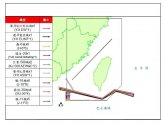Looking around the world, we have many examples of pairs of nominally independent countries that basically act as a single entity when it comes to foreign policy positions, geopolitics and security issues. They are also so heavily integrated on an economic, linguistic, and cultural level so as to be virtually indistinguishable outside of small nuances. I am referring to the relationship between Belarus and Russia, and between Canada and the US to an extent.
Obviously, in the case of Taiwan, the current domestic political environment basically equates a pro-independence position with an anti-China position. Part of this pattern of preferences is internally consistent, because China is the insurmountable hurdle preventing independence. But for pretty much every pro-independence Taiwanese, there is always this intrinsic disdain for China's political system, and foreigner worship. But this does not have to be the case on a philosophical level - one can plausibly advocate independence but want to maintain a strong bond between the island and the mainland on every level.
One question I have pondered for a long time is this, and it is entirely hypothetical. If the cold logic driving Beijing's need to take Taiwan is one of security and geography, would it be willing to settle for something akin to the relationship between Russia and Belarus? In fact, one can argue from a security perspective that this is preferrable to the current arrangement, because de facto control is surely more advantageous than de facto autonomy. Again, purely hypothetical, but I have never heard any sort of answer or contemplation of that pathway.
Edit: I do NOT support independence, please don't attack

I believe you are the Eurasian Naval Insight guy on Youtube, correct?
Either way, back to the point of this thread's discussion.
To be honest with you, Russia and Putin are actually very lucky today because:
1 - Russia and Belarus are
close allies;
2 - Belarus is
lead by Lukashenko ever since Belarus split from the USSR in 1991; and
3 - Russians and Belarussians are generally
on friendly terms with each other.
If the
opposite is true, Belarus would have
become the 2nd Ukraine of today for Russia. Also, Moscow would be just within 400 kilometers away from NATO borders, instead of the present 500+ with the Baltic countries and (Ukraine if they managed to join NATO).
Furthermore, when Lukashenko is no longer the President of Belarus in the future, and if someone else with completely different ideas than Lukashenko on how to deal with Russia and the EU takes over the presidency of Belaurus - Is there
any guarantee for Russia that Belarus would not become the 2nd Ukraine for Russia in the future?
I believe the answer is clear to everyone here.
In fact, if China and Taiwan wants to go the path of Russia and Belarus, that means
similar implications and possibilities would also arise for China.
Would there be
any guarantee for China that in the future:
1. Taiwan would
never turn its back against China?
2. Taiwan would
never host foreign swords directed up against China's very own throat?
3. Taiwan would
never work against the security, soverignty and survival of China?
Actually, you can forget about those guarantees -
Taiwan is already in the process of becoming the East Asia version of Ukraine for China, thanks to none other than the United States and the DPP.
Since Taiwan is already making itself into the East Asia version of Ukraine, then why should China even bother wasting her energy to form the East Asia version of Russia-Belarus status at all?
Therefore -
NO, I don't see the analogy based on the current Russia-Belarus status can be anywhere close to becoming viable for the current China-Taiwan status.
Speaking of which - If anyone has visited China's version of Youtube, i.e. Bilibili, you would have noticed that there are often continuous flows of pop-up comments left by viewers on top of the video that is being played.
Here's one particular Bilibili video, which is a trailer for a mini movie made using DCS and Arma 3:
The mini-movie trailer is about the hypothetical war of reunification of Taiwan into China proper.
And if you notice the flow of pop-up comments at the beginning of the video, these three phrases appear the most frequent:
In English:
Return of the Lost Population
Unification of the Mountains and Rivers
Unification of the (Chinese) Homeland
I know this is just a fan made-in-game mini-movie trailer about a hypothetical war scenario, but the message from those pop-up comments left by the viewers is very obvious.
Henceforth, you can be certain of one thing -
China,
Beijing and the
Chinese people would
never, ever agree to such kind of status being imposed on China-Taiwan.
China would rather
go to war, against anyone, at any cost - In order to prevent Taiwan from permanenetly seperating from China (just like what the Minister of National Defense of China Wei Fenghe has declared in Shangri-La earlier this month).

